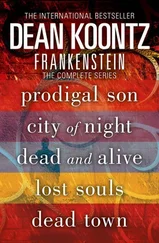“Tragic. Her string's been cut too soon. Her music's ended prematurely,” Junior said, feeling confident enough to dish a serving of the maniac cop's half-baked theory of life back to him. “There's a discord in he universe now, Detective. No one can know how the vibrations of that discord will come to affect you, me, all of us."
Repressing a smirk, feigning a respectful solemnity, he dared to glance at Vanadium, but the detective stared into Naomi's grave as though he hadn't heard the mockery-or, having heard it, didn't recognize it for what it was.
Then Junior saw the blood on the right cuff of Vanadium's shirt. Blood dripping from his hand, too.
The thorns had not been stripped from the long stem of the white rose. Vanadium clutched it so tightly that the sharp points punctured his meaty palm. He seemed to be unaware of his wounds.
Suddenly and seriously creeped out, Junior wanted to get away from this nut case. Yet he was frozen by morbid fascination.
“This momentous day,” Thomas Vanadium said quietly, stiff gazing into the grave, “seems full of terrible endings. But like every day, it's actually full of nothing but beginnings."
With a solid thump, Naomi's fine casket reached the bottom of the hole.
This sure looked like an ending to Junior.
“This momentous day,” the detective murmured.
Deciding that he didn't need an exit line, Junior headed toward the service road and his Suburban.
The pendulous bellies of the rain-swollen clouds were no darker than when he had first come to the cemetery, yet they appeared more ominous now than earlier.
When he reached the Suburban, he looked back toward the grave.
The mortician and his assistant had nearly finished dismantling the frame of the winch. Soon a worker would close the hole.
While Junior watched, Vanadium extended his right arm over the open grave. In his hand: the white rose, its thorns slick with his blood. He dropped the bloom, and it fell out of sight, into the gaping earth, atop Naomi's casket.
On this Monday evening, with both Phimie and the sun having traveled into darkness, Celestina sat down to dinner with her mother and her father in the dining room of the parsonage.
Other members of the family, friends, and parishioners were all gone. Uncanny quiet filled the house.
Always before, this home had been full of love and warmth; and still it was, although from time to time, Celestina felt a fleeting chill that couldn't be attributed to a draft. Never previously had this house seemed in the least empty, but an emptiness invaded it now-the void left by her lost sister.
In the morning she would return to San Francisco with her mom.
She was reluctant to leave Daddy to adapt to this emptiness alone.
Nevertheless, they must leave without delay. The baby would be released from the hospital as soon as a minor infection cleared up. Now that Grace and the reverend had been granted temporary custody pending adoption, preparations had to be made for Celestina to be able to fulfill her commitment to raise the child.
As usual, dinner was by candlelight. Celestina's parents were romatics.
Also, they believed that gracious dining has a civilizing effect on children, even if the fare is frequently simple meat loaf.
They were not among those Baptists who forsook drink, but they served wine only on special occasions. At the first dinner following a funeral, after the prayers and the tears, family tradition required a toast to the dearly departed. A single glass. Merlot.
On this occasion, the flickering candlelight contributed not to a romantic mood, not to merely a civilizing ambience, but to a reverential hush.
With slow, ceremonial grace, her father opened the bottle and served three portions. His hands trembled.
Reflections of lambent candle flames gilded the curved bowls of the long-stemmed glasses.
They gathered at one end of the dining table. The dark purple wine shimmered with ruby highlights when Celestina raised her glass.
The reverend made the first toast, speaking so softly that his tremulous words seemed to bloom in Celestina's mind and heart rather than to fall upon her ears. “To gentle Phimie, who is with God."
Grace said, “To my sweet Phimie ... who will never die."
The toast now came to Celestina. “To Phimie, who will be with me in memory every hour of every day for the rest of my life, until she is with me again for real. And to ... to this most momentous day."
“To this momentous day,” her father and mother repeated.
The wine tasted bitter, but Celestina knew that it was sweet. The bitterness was in her, not in the legacy of the grape.
She felt that she had failed her sister. She didn't know what more she could have done, but if she'd been wiser and more insightful and more attentive, surely this terrible loss would not have come to pass.
What good was she to anybody, what good could she ever hope to be, if she couldn't even save her little sister?
Candle flames blurred into bright smears, and the faces of her good parents shimmered like the half-seen countenances of angels in dreams.
I know what you're thinking,” her mother said, reaching across the table and placing one hand over Celestina's. “I know how useless you feel, how helpless, how small, but you must remember this . . .
Her father gently closed one of his big hands over theirs.
Grace, proving again the aptness of her name, said the one thing most likely, in time, to bring true peace to Celestina. “Remember Bartholomew."
THE RAIN THAT HAD threatened to wash out the morning funeral finally rinsed the afternoon, but by nightfall the Oregon sky was clean and dry. From horizon to horizon spread an infinity of icy stars, and at the center of them hung a bright sickle moon as silver as steel.
Shortly before ten o'clock, Junior returned to the cemetery and left his Suburban where the Negro mourners had parked earlier in the day. His was the only vehicle on the service road.
Curiosity brought him here. Curiosity and a talent for self-preservation. Earlier, Vanadium had not come to Naomi's graveside as a mourner. He had been there as a cop, on business. Perhaps he had been at the other funeral on business, too.
After following the blacktop fifty feet, Junior headed downhill through the close-cropped grass, between the tombstones. He switched on his flashlight and trod cautiously, for the ground sloped unevenly and, in places, remained soggy and slippery from the rain.
The silence in this city of the dead was complete. The night lay breathless, stirring not one whisper from the stationed evergreens that stood sentinel over generations of bones.
When he located the new grave, approximately where he'd guessed that it would be, he was surprised to find a black granite headstone already set in place, instead of a temporary marker painted with the of the deceased. This memorial was modest, neither large nor complicated in design. Nevertheless, often the carvers in this line of business followed days after the morticians, because the stones to which they applied their craft demanded more labor and less urgency than the cold bodies that rested under them.
Junior assumed the dead girl had come from a family of stature in the Negro community, which would explain the stonecarver's accelerated service. Vanadium, according to his own words, was a friend of the family; consequently, the father was most likely a police officer.
Junior approached the headstone from behind, circled it, and shone the flashlight on the chiseled facts:
... beloved daughter and sister...Seraphim Aethionema White.
Stunned, he switched off the flashlight.
He felt naked, exposed, caught.
In the chilly darkness, his breath plumed visibly, frosted by moonlight. The rapidity and raggedness of his radiant exhalations would have marked him as a guilty man if witnesses had been present.
Читать дальше











